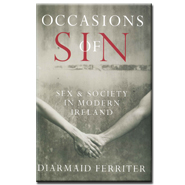Posted 23 September 2009
Occasions of Sin
UCD historian publishes the “definitive sexual history of 20th Century Ireland”
Diarmaid Ferriter’s book Occasions of Sin – Sex & Society in Modern Ireland, takes a look at Irish society from the mid 19th century through a journey from sexual repression, moral hypocrisy, and legal double standards to the first decade of the 21st century when sexual freedom, open media, and individualism knock the whole notion of sex as a sin firmly on the head.
Ferriter chronicles the role of the Catholic Church, the shift in society from Victorian conservatism to hedonistic liberalism and the gradual voice taken by women and the gay community in order to force public acknowledgement of cruelty and injustice.
Two themes intertwine in the book. The first, more sinister, is the role of the political and justice systems which, in the early part of the 20th century, facilitated the incarceration of “fallen” women in order to remove them (and their temptations) from society. And later, were forced to face the inconsistency of sentencing as victims of sexual crime (such as Lavinia Kerwick, strove for justice, mainly through the media.
The second theme relates to public acceptance of sexual behaviour and the liberalisation of Irish society which, by the beginning of the 21st century, had taken a pendulum swing away from the covert behaviour and forced celibacy of post-famine Ireland.
Through these themes, the book interrogates the relationship between power and perceptions.
Launching the book, journalist and commentator, Fintan O’Toole said that “the book explores the shift between ideas of sex as private and personal on the one side and the creation of sex as a marker of public identity on the other.” He added that the book overturned some of his own perceptions. “We think of contemporary society as one that is saturated by sex to a degree that was not true before. But when you look at the material in the way that Diarmaid Ferriter has done, and examine the way in which sexuality has been critical in both positive and mostly negative senses in determining public identity and shaping ideas of power, you realise that Ireland was much more saturated with the second kind of sex – the abstract kind of sex - then than it is now.
There is perhaps some sort of direct and inverse relationship between the degree to which sexuality is represented and discussed in public on the one side and the actual importance it has for the shaping of ideas about power and human relations and nationality on the other.”
Ferriter himself says that his book was researched and written during a time when it appeared that there was an unprecedented amount of sexual indulgence in Ireland. “By the beginning of the 21st Century, Ireland seemed to be in the throes of a delayed sexual revolution, as a country long accustomed to a strict policing of sexual morality had carnally come of age.” But, he points out, “if the infamous comment of Fine Gael politician Oliver J Flanagan, who announced on an Irish television programme in the early 1960s that ‘there was no sex in Ireland before television’ were true, this would be a much shorter book than it is.
The sexual history of Ireland is just as complicated and multilayered as the sexual history of many other countries. While acknowledging the influence of Catholicism and the ‘thematic of sin’, this book uncovers numerous discourses that were independent of, or in opposition to, the Church and shows that the State in its reports was not always just framing its observations or comments in the context of religious sensibilities. Issues such as the appropriateness of State intervention, civil rights, public health and living conditions also played their part.”
Comprehensive and thought-provoking, Occasions of Sin prompts the reader to reconsider contemporary perceptions of Ireland’s social history over the last century and to recognise that sexual behaviour wasn’t so different one hundred years ago but rather that public perception was controlled in order to hold power over the people.

